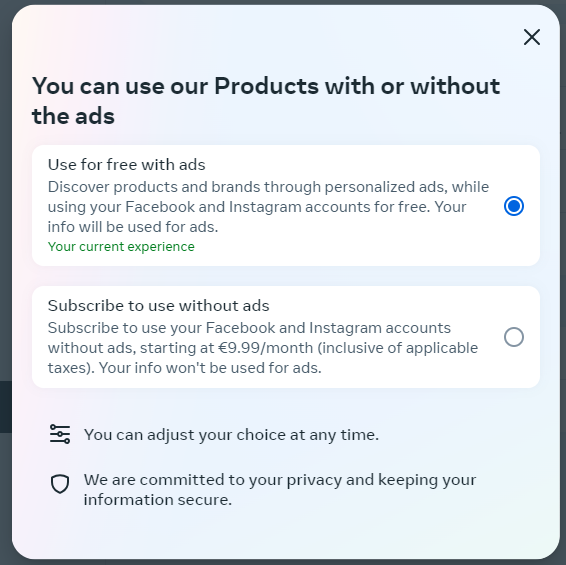Meta sued over forcing users to pay to stop tracking
Meta is required to get users’ consent in Europe in order to show them targeted ads. For this reason, Meta has to provide European users with a way to opt out of behavioral advertising or face fines totalling $100,000 a day.
Behavioral advertising are ads tailored to someone’s browsing habits and other online behavior. A profile of the user is built up over time, as they work their way around the web. Tracking users in this was was ruled as a break of GDPR regulations, so Meta had to find a way out.
Meta’s solution was to charge users for an ad-free experience. The choice for European users was keep using Facebook for free or pay to enjoy the platform without personalized ads. In order to enjoy your fundamental rights under EU law, Meta is essentially now proposing that users pay up to $275 per year.
However, organizations concerned about our privacy say that by doing this, Meta has changed the user’s choices from “yes or no” to “pay or okay.”
To put this into perspective, Meta’s annual revenue in 2022 was $120.18 Billion. If every user that visits Facebook daily (2.037 billion) forked out $275 per year, that would bring in roughly $560 Billion.

The price is higher for mobile users and will rise further in 2024 for additional accounts. And note that for each linked account (Instagram) you pay an additional € 8 per month.
From Meta’s point of view it is doing the world a service by providing personalized ads.
“Every business starts with an idea, and being able to share that idea through personalized ads is a game changer for small businesses.”
But privacy group nyob (none of your business) says that keeping your personal data private is a fundamental right.
“Fundamental rights cannot be for sale. Are we going to pay for the right to vote or the right to free speech next? This would mean that only the rich can enjoy these rights, at a time when many people are struggling to make ends meet. Introducing this idea in the area of your right to data protection is a major shift. We would fight this up and down the courts.”
And they meant it. On November 28, 2023, nyob filed a complaint against Meta with the Austrian data protection authority. The group considers Meta’s action yet another attempt to circumvent EU privacy laws.
“Not only is the cost unacceptable, but industry numbers suggest that only 3 percent of people want to be tracked – while more than 99 percent decide against a payment when faced with a privacy fee.”
This strongly suggests that the EU law, which demands that consent should be “freely given” is not met in this case.
Max Schrems, the chairman of noyb said:
“When 3 percent of people actually want to swim, but 99.9 percent end up in the water, every child knows that it wasn’t a “free” choice. It’s neither smart nor legal – it’s just pitiful how Meta continues to ignore EU law.”
Meta said in response, that it had obtained a ruling of the Court of Justice of the European Union (CJEU) that accepted the subscription model as a valid form of consent for an ads funded service. It also said its pricing was in line with those of ad-free services such as YouTube Premium and Spotify Premium.
However, it conveniently seems to “forget” that ad-free services are not the same as those that gather data about you and sell them to the highest bidder to create personalized ads.
We don’t just report on threats—we remove them
Cybersecurity risks should never spread beyond a headline. Keep threats off your devices by downloading Malwarebytes today.